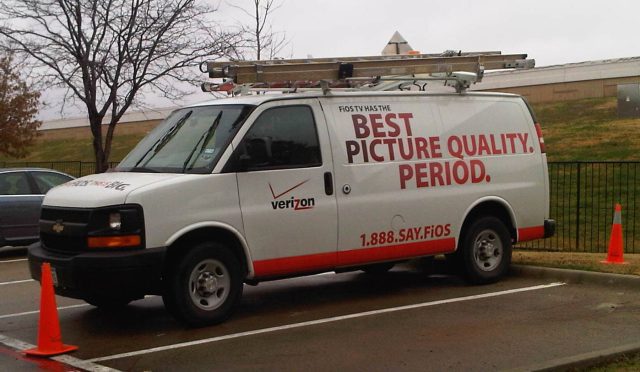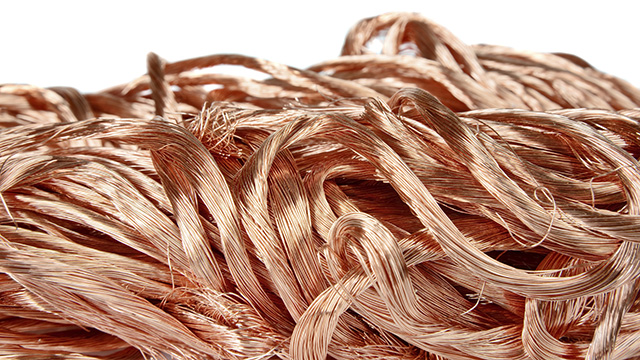
The shift from copper landlines to fiber-based voice networks is continuing apace, and no one wants it to happen faster than Verizon.
Internet users nationwide are clamoring for fiber, as well, hoping it can free them from slower DSL service or the dreaded cable companies. But not everyone wants fiber, because, when it comes to voice calls, the newer technology doesn’t have all the benefits of the old copper phone network. In particular, fiber doesn’t conduct electricity, where copper does. That means when your power goes out, copper landlines might keep working for days or weeks by drawing electricity over the lines, while a phone that relies on fiber will only last as long as its battery. That's up to eight hours for Verizon’s most widely available backup system.
Thus, while many customers practically beg for fiber, others—particularly those who have suffered through long power outages—want Verizon to keep maintaining the old copper lines. But Verizon continues pressuring customers to switch, and it’s getting harder to say no.
“Verizon's efforts to force people off copper in my area of Rhode Island rise to the level of harassment,” Verizon customer Karen Anne Kolling of North Kingstown, Rhode Island, told Ars.
Kolling is one of numerous Verizon customers who got in touch with Ars in response to articles on the in-progress shutoff of the traditional telephone network. “They have contacted me at least 10 to 20 times in the last year, including showing up unannounced on my doorstep to tell me they were switching me to FiOS," Kolling said. "So far I have managed to save my landline in this area, which is subject to power failures from hurricanes.”
Verizon spokesperson John Bonomo told Ars in an e-mail, "We do not 'show up unannounced' to people’s homes. We have to install equipment in customers’ homes, and then very likely we need to do additional work inside the home."
Verizon has 4.9 million residential landline customers still on copper networks, with 5.5 million getting voice service over fiber. Public interest groups and consumers have accused Verizon of letting copper networks deteriorate and using their degraded status to push fiber upgrades. Verizon made $31.5 billion in revenue last quarter along with $4.3 billion in profit. But its wireline business has struggled, with the fiber-based FiOS products propping it up. Total wireline revenue in Q2 2014 was $9.8 billion, up 0.3 percent, the first year-over-year increase in more than seven years. FiOS was the main driver of growth, with revenue increasing 14 percent over the previous year, hitting $3.1 billion.
Verizon cut investment in its wireline business—it had 80,600 wireline employees as of June 30, 2014, down from 84,700 in 2013, 88,600 in 2012, and 93,200 in 2011. Verizon also reduced capital expenditures from $2.95 billion in the six months ending June 30, 2013 to $2.73 billion in the six months ending June 30, 2014.
“They told me if my copper-based landline needs repair, they will not repair it. So I'll have no choice but to switch to FIOS or Cox, both of which have limited time battery backup in the event of power failures,” said Kolling, a longtime software engineer who worked for Xerox PARC, Digital, and Adobe.
Despite Verizon’s warnings, Kolling’s copper lines have continued to work. “I probably have received at least 15 phone calls over the past year or so, and usually they start out with some statement like, ‘due to many problems with your phone service, we are switching you to FIOS,’” Kolling said. “I asked one of these callers what all these problems were, and she found one: eight years ago, in 2006, an outside wire came down and needed to be reattached.”
Kolling said she went up the food chain and was promised by a Verizon executive that residents will receive 30 days' notice if Verizon decides to completely turn off copper-based landline service where she lives. “I hope this is correct, so I have been ignoring them ever since,” she said.
Across the country, Verizon customers tell the same story

Kolling’s story is nearly identical to ones told by Verizon customers from the East Coast to California. Besides the ones who spoke with Ars, others have registered their frustrations in official government proceedings. In May, Public Knowledge and 11 other public interest groups asked the FCC to investigate these complaints and consider enforcement actions. (The groups' letter described complaints about AT&T and Frontier, but the large majority of complaints were directed at Verizon.) The FCC hasn't taken any action in response.
David Berg of Bethesda, Maryland, has managed to keep his copper landlines, though not without hassle. "Verizon appears to be trying hard to get rid of land lines in my area," he told Ars. "They most recently let our landline stay broken for roughly a month while they claimed to be working on an 'area problem.' Actually, the problem with our line was inside the house. Surprise! They also claimed to have fixed it when I called them repeatedly (from my cell phone) to tell them it still wasn’t working properly."
For that month in late spring, Berg said his landline "worked with varying degrees of noise and diminished sound quality. Most of the time, you couldn’t really hear over the hum and other noises and had to give up until later."
“I told them that I never want my copper to be removed, ever.”
Verizon tried to convince him to switch to fiber, but Berg refused. "They finally sent a technician to fix it," he said. "He knocked on the door to say that it was working perfectly well. I invited him in to see that it was not. He worked on it for a couple of hours inside the house and finally got it working without a strong hum, pops, and hisses."
The fix was just in time, because "we’ve had at least three [power] outages this summer, and the copper-based landline worked through them all," Berg said.
Mike Keys of Huntington, New York, has similarly resisted Verizon’s attempts to push him onto fiber. Keys uses FiOS for Internet and TV, but also has three traditional landlines on the copper network, in part because he runs a small computer consulting business and provides phone support to customers from his home. When Keys had FiOS installed, he insisted that Verizon let him also keep the copper phone lines.
“I have two sick people in the house,” Keys said. “Going through Hurricane Sandy, I had no power for 12 days, and I was the only one on the block who had phone service. Everyone else switched to the cable company or FiOS. At the beginning of my block, a tree fell on the lines, and this is interesting, it took out the electricity, it took out cable TV, it took out FiOS, but it did not bring down the copper cable.”
A year or so ago, Keys came home to find that two of his phone lines had been shut off, he said. "Calling them was a total waste of time. No one there knew anything about what happened," he said. He was able to get his service turned back on after about a week, but said he continues to get phone messages from Verizon that say, “they're discontinuing their old copper network, and they want to switch me to the new digital telephone service."
Keys delivers a consistent response: “I told them that I never want my copper to be removed, ever."
Customers will lose copper, and perhaps consumer protections

Verizon is getting a head start on the transition by retiring copper networks in favor of fiber ones. Customers moving from copper to fiber aren’t necessarily disconnected from the PSTN, because fiber can handle both the traditional circuit-switched phone network (also known as POTS, for Plain Old Telephone Service) and the new, largely unregulated VoIP phones.
Many customers do not understand that Verizon sells both regulated and unregulated phone service over fiber. Verizon insists that it is careful to explain the difference between POTS over fiber and VoIP.
"When we approach customers about switching to fiber for their telephone service, they often jump to the incorrect impression that we are trying to force them to FiOS," Bonomo said. "That is our responsibility that we communicate this clearly, and we want to make sure they understand they can get POTS over fiber, without necessarily getting our FiOS products. We are conscious about this, and we strive to make sure our customers understand the difference."
Customers who get VoIP over fiber today are not protected by the government-regulated prices that apply to traditional landlines, and they are not protected by rules that guarantee quality of service and prohibit slamming and cramming, Public Knowledge Senior Staff Attorney Jodie Griffin told Ars. Consumers' ability to petition state utility commissions for help in disputes against the phone companies is also limited if they have switched from a traditional landline to VoIP.
The FCC has issued some rules governing VoIP service, such as 911 requirements, but it hasn’t yet decided whether VoIP should be regulated as a utility after the traditional phone network is completely shut off. States also hold power over phone companies, but AT&T and Verizon have successfully lobbied many of them to restrict state oversight and eliminate universal service guarantees—despite Verizon relying on utility status to gain government perks in the building of its fiber network.
A fiber line that carries POTS traffic is still subject to utility regulations. But whether a fiber line carries POTS or VoIP traffic, it does not provide electricity to phones during outages.
reader comments
262